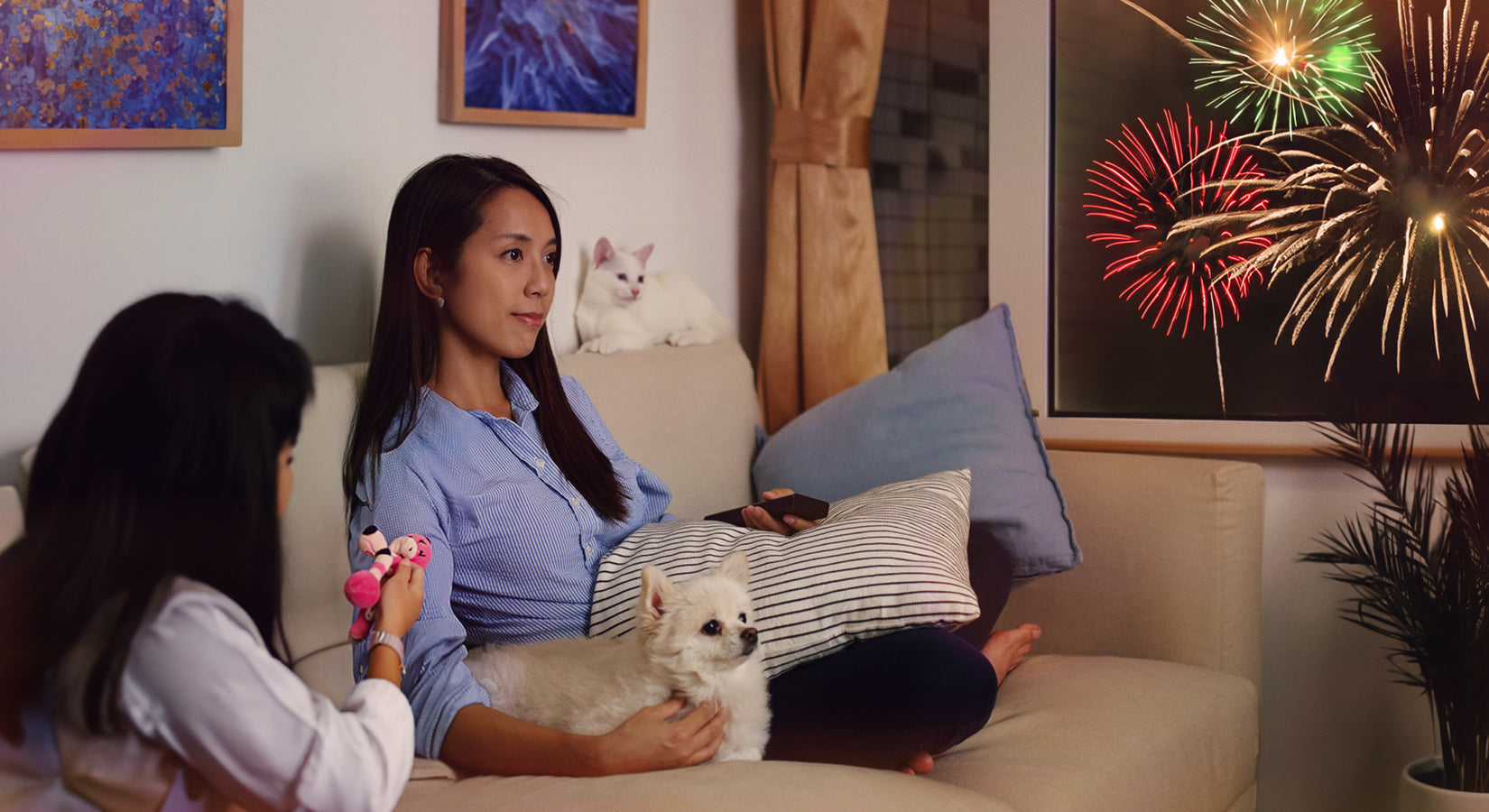Flash, bang, whizz – yep, firework season is nearly here!
And, although Bonfire Night is a fun event for us humans, those unexpected bangs and flashes can be very scary for your pets. What’s more, 5th November comes hot on the heels of Halloween – so all this hocus pocus can make for a confusing time for our furry friends.
If your cat or dog is scared of fireworks, it can be hard to know what to do, especially if you’ve recently welcomed a new pet to the family. But preparation is key – according to the RSPCA, 69% of UK adults take measures to help relax or prepare their pets for firework season.
So, what can you do to help your pet cope with the stress of Bonfire Night?
Read on to discover our top tips, created with help from our Friend of Closer Pets, the National Animal Welfare Trust (NAWT).



- Walk before dark
“Walk your dog before it gets dark, as fireworks can kick off as early as 5.30pm – and it’s important that they get home before the noise starts. And give them lots of exercise during the day so you wear them out!” – Josie, NAWT
What’s more, if your cat freely roams outside, make sure they’re inside well ahead of time. It might also be an idea to feed your pet before it gets too noisy, as they might be too stressed to eat.

- Talk to your neighbours
We all know the feeling of having firework noises seemingly coming from all directions; however, if you know that loud noises make your dog or cat nervous, planning is key.
If your immediate neighbours are keen on home firework displays, it’s worth talking to them and explaining the situation. Once they know your pet is afraid of fireworks, they might opt to go to a local show rather than set off flashes in their garden. Don’t worry about being a party pooper – put your furry friends first!



- Keep things calm
Don’t leave your pet alone – make sure you’re there to provide comfort and reassurance. Close windows and curtains to muffle the sound and flashes of the fireworks, and don’t react to the firework noises yourself.
“Something we do with our pets here is play classical music. You could pop the TV or radio on for your pet, nice and loud. Classical music is really good as it brings them to a natural rest and drowns out the noise of the fireworks.” – Josie, NAWT
Provide entertainment such as a game, training, find and seek or a toy filled with treats. You could play with a toy to see if your dog or cat wants to join in, but don’t force them to play or come out if they’re hiding.
Dogs and cats also tend to drink more when stressed, so make sure they have plenty of water handy.

- Create a safe space
“You can also make a little safe space in your house for your pet that they know they can retreat to if the fireworks do get a bit scary. Set up a nice corner with a comfort bed and blanket and one of their favourite toys.” – Josie, NAWT
From a doggy den made of blankets to a ‘box fort’ for your feline friends, these cosy time-out zones are super-quick and easy to make. If your dog is used to being in a crate, cover it and leave it open with blankets inside. Don’t lock the crate, as this can be even more stressful for your canine companion.

- Secure any potential escape routes
Escape-proof your house and garden – close your windows and lock any cat flaps or doggy doors once your pet is safely inside. If you need to pop outside, make sure your furry companions are contained in another room or behind a stair gate to ensure they can’t shoot through the open front door.

- ‘Can I see your ID?’
Pets are masters of escape, so if your dog or cat does get startled and manages to get out of the house, having an up-to-date ID tag on their collar and also a microchip are vital in getting them back home safe and sound. Double-check that their collar/ID tag is secure, and keep the information on their tags and microchips current.

- Reassure and reward
Lastly, remember to comfort and reassure your pet. Dogs can tell how their owners are feeling, so stay calm and don’t punish any naughtiness that stems from anxiety. It’s important to reinforce good behaviour, too – be liberal with the praise and cuddles if your dog displays calmness and responds well to cues. Your cat may wish to be left alone if they’re stressed; however, if they come to you for a snuggle, make sure your arms are wide open!
Please note that if your pet is very worried by visitors or fireworks, it’s worth talking to your vet to see if they need longer-term behavioural treatment or pheromone diffusers – or medication if there’s an underlying health problem.
For more helpful tips and videos about caring for your pets during fireworks season, visit the RSPCA website here.
